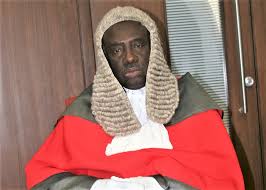The Supreme Court has on Wednesday declared as unconstitutional Gambia’s toughest media law which prescribes 15-year jail term or a fine of D3 million for anyone found guilty of broadcasting false news on the internet.

The Supreme Court of The Gambia has on Wednesday dismissed a case brought by Gambia Press Union challenging the constitutionality of sedition, saying the law that journalists consider draconian offers reasonable restriction necessary in a democratic society.
However, the 5-member panel of jury led by chief justice Hassan Jallow also upheld that sedition should only cover the presidency and not the Government.
Meanwhile, the country’s top court has declared criminal defamation and 2013 information and communications act which applies to the internet as unconstitutional.
The law which is referred to as the Nana Law has been enacted by the National Assembly in 2013 and it is considered Gambia’s toughest media law which prescribes 15-year jail term or a fine of D3 million for anyone found guilty of broadcasting false news on the internet.
Hawa Sisay Sabally, the lawyer for GPU told journalists following the verdict that the challenge to the sedition law is successful in part.
“The aspect that deals with the Government was held by the Supreme Court to be unconstitutional but they have offered protection to the president. The second part that deals with the president is constitutional. So in so far as it relates to the president, sedition remains a law in the country,” Sabally said.
“Law on defamation has been taken out and the laws relating to the internet such as false news and caricature of public officials has also been struck out…
“What happens is that speech will no longer be criminalized in this country and in as much as we have sedition still in the books in a limited form, I think we can safely say that journalists can enjoy their work now. Those factors that used to deter them in doing their work will no longer be there.”
The Supreme Court ruling conflicts with the ruling made by the regional court of the Economic Community of West African States (ECOWAS) in February 2018.
The Regional Court ruled that the Gambia’s draconian media laws on sedition, false news and criminal defamation violate the right to freedom of expression.
But for the press union, the battle against what they consider bad media laws are not over yet.
The president of the GPU, Emile Touray, said the Union may consider ‘filling an application for the court to review its decision’.
“We are elated that the Supreme Court has declared criminal defamation and false publication unconstitutional. We are, however, sad that sedition and false publication and broadcasting are retained in the criminal code,” Touray told Kerr Fatou after the verdict.
The GPU has started the litigation since 2015 but it could not proceed because there were no judges at the Supreme Court.
However, despite the Supreme Court judgment, the Barrow administration said they have conceded on the unconstitutionality of libel, criminal defamation and sedition but maintained that false news places “reasonable restriction necessary in a democracy”.
So even whereas the country’s top court has agreed that sedition is constitutional, the Government has promised not to apply the law.
Gambia government has established a committee to reform media laws and GPU is represented at the table.


Comments are closed.